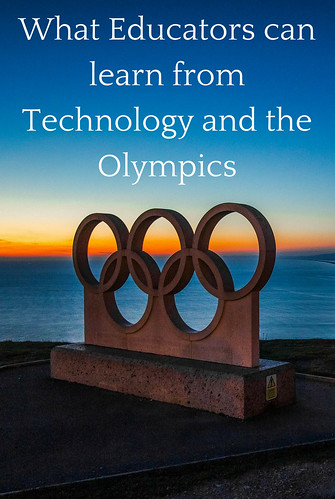What Educators can learn from Technology and the Olympics
Educators can learn quite a bit from the technology used during the Olympics. The Olympics – similar to a classroom? How can this be?
Here are 4 ways that educators can look at the way technology is used in the Olympics – and apply it to their classrooms.

1. Social Media
The London Olympics was billed as the first Social Media Olympics. While some can view this as a spoiler (i.e., fans tweeting and facebooking results), NBC has joined in the Social Media extravaganza and covers the Olympic Games in real time with Facebook, Twitter, Instagram, and on other social media sites. What can educators take from this? Social Media is omnipresent. Educators can embrace social media, and work it into their classrooms. Follow current events on Twitter. Use Facebook to do research. Create assignments that include social media in the research methods. It won’t replace traditional research and learning, but rather, enhance it.
2. Instant Results
No longer do people have to wait for news about the Olympics – technology means we know the results instantly. This world we live in is so interconnected that we can learn things almost as soon as they happen. Utilize this and follow current events – elections, sporting events, chess tournaments, funerals, arts events, festivals, concerts; or connect with global classrooms to learn together. By keeping your finger on the pulse of the world, you also teach that globally, everyone and everything is important. Teach global awareness and global citizenship by learning about things happening around the world – and their impact on locals.
3. Stories
In the Olympics, each person has a story. We see amazing stories from around the world - of hardship, challenge, hard work, and perseverance. In real life, each person also has a story. Listen to each student, to their stories. Incorporate stories – your students’ stories, as well as everyone they come into contact with – into your classroom, assignments, and ways of teaching. When students learn the personal, they are more interested in the topic. A history assignment could include video interviews with people that have lived through it, or re-enactors. A language assignment could include finding people – and them telling their stories – in their native language.
4. Practice
Every single person in the Olympics has spent an inordinate amount of time practicing their sport. But technology also plays a part in winning – from the technology used for keeping times and scoring, to new technology in the things athletes need to succeed (the shark suit for swimmers, shoes, gear). With limited budgets in many school districts nowadays, the latest technology isn’t always available. But you can make sure that your students have the basics of using technology – teaching them how and why to utilize the internet, videos, podcasting, etc. – and giving them the skills (writing, critical thinking, languages) for success.
There are many ways to get kids excited about the Olympics. But watch the Olympics with an eye to how technology allows for new ways of viewing, interacting with, and teaching about the world. Your students will thank you!
Note: this article was originally published in 2012 and updated in 2018






















